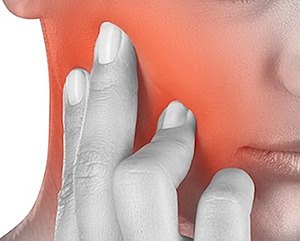Jaw Joint Pain, Causes and Treatment
March 1st, 2022
The temporomandibular joint (TMJ), more commonly known as the jaw joint, is a small joint at the side of the skull, just below the ear. It allows your lower jawbone, the mandible, to move which in turn allows you to eat and speak, amongst other things. For such a small joint it has a very important job!
However, some people experience pain on these normal but essential everyday movements, a condition known as TMJ disorder (often shortened to just ‘TMD’), TMJ dysfunction or even TMJ pain and myofascial pain disorder. Sometimes pain can be the only symptom, but pain can also be absent. Popping, clicking, grating or grinding sensations may be experienced when opening and closing the mouth and headaches, migraines, facial pain, dizziness, vertigo and tinnitus can also be associated with the condition.
The causes of TMD are varied, including problems within the joint itself but also with the muscles surrounding the joint that make the jaw move. Problems with the muscles are generally more common, but both can be present at the same time. Poor posture can also play a role in TMD, as can dental disease.
Joint problems:
The jaw joint consists of two bones: the maxilla (which is part of the skull) and the mandible, which is suspended below it. The two bones come together at the TMJ. Like other joints, the surfaces of these bones at the joint are covered with cartilage, and there is also a disc in-between whose job is really to act as a cushion. Consequently, like many other joints, the TMJ can also be affected by arthritis, usually osteoarthritis, although both rheumatoid arthritis and gout are also possible.
A direct injury or trauma to the jaw may also lead to the condition.
Muscular problems:
Overuse of the jaw muscles from excessive tooth grinding or clenching (termed ‘bruxism’), or habitually chewing gum or nail-biting can cause TMD.
Between 8% and 10% of the population are thought to suffer from bruxism, which can occur either at night, called ‘sleep bruxism’, or during the day ‘awake bruxism’. Stress is thought to play a significant role with both types and some more recent research has made a link between sleep disorders and sleep bruxism.
Dental problems, such as malocclusion (a problem in how well the lower and upper teeth meet) can also lead to TMD. This can be an inherited problem with the structure of the jaw or being born with too many or too few teeth.
Malocclusion can also result from habits such as finger or thumb sucking or from losing too many teeth due to dental disease or trauma. If malocclusion is suspected, then it is always a good idea to consult a dentist to determine if this issue is present.
Treatment options:
Treatment options are varied and often ‘one size does not fit all’! Both chiropractic and massage treatments can help by addressing trigger points, which are tight bands or nodules within muscles fibres, allowing relaxation of the muscles performing the excessive jaw movements. Intra-oral techniques can be particularly effective at working the trigger point present in the muscles that help you chew, for example the masseter and the temporalis muscles.
Postural issues may also be addressed via chiropractic adjustments of the spine to assist in the realignment of the neck and upper back. Postural exercises and stretches to do at home will often be included in a chiropractic care plan and are helpful in making long-lasting changes and preventing the condition returning.
Ditching the chewing gum and nail-biting can also help and see a dentist if dental pain is preventing you chewing on both sides of your mouth, or a malocclusion is suspected.
Sufferers can also benefit from trying to reduce stress, in particular adopting relaxation techniques such as breathing, meditation and mindfulness.
Over time, with treatment and addressing the specific causes or factors that may be contributing to your condition, your symptoms can be much improved.
We can help! Mark Jones at Well Adjusted Health is able to assess and treat these symptoms.
If you are experiencing this or any other pain and would like an expert opinion, please contact Well Adjusted Health on: 01903 892171
You can also book a Free 15 minute consultation for you or your family.
However, some people experience pain on these normal but essential everyday movements, a condition known as TMJ disorder (often shortened to just ‘TMD’), TMJ dysfunction or even TMJ pain and myofascial pain disorder. Sometimes pain can be the only symptom, but pain can also be absent. Popping, clicking, grating or grinding sensations may be experienced when opening and closing the mouth and headaches, migraines, facial pain, dizziness, vertigo and tinnitus can also be associated with the condition.
The causes of TMD are varied, including problems within the joint itself but also with the muscles surrounding the joint that make the jaw move. Problems with the muscles are generally more common, but both can be present at the same time. Poor posture can also play a role in TMD, as can dental disease.
Joint problems:
The jaw joint consists of two bones: the maxilla (which is part of the skull) and the mandible, which is suspended below it. The two bones come together at the TMJ. Like other joints, the surfaces of these bones at the joint are covered with cartilage, and there is also a disc in-between whose job is really to act as a cushion. Consequently, like many other joints, the TMJ can also be affected by arthritis, usually osteoarthritis, although both rheumatoid arthritis and gout are also possible.
A direct injury or trauma to the jaw may also lead to the condition.
Muscular problems:
Overuse of the jaw muscles from excessive tooth grinding or clenching (termed ‘bruxism’), or habitually chewing gum or nail-biting can cause TMD.
Between 8% and 10% of the population are thought to suffer from bruxism, which can occur either at night, called ‘sleep bruxism’, or during the day ‘awake bruxism’. Stress is thought to play a significant role with both types and some more recent research has made a link between sleep disorders and sleep bruxism.
Dental problems, such as malocclusion (a problem in how well the lower and upper teeth meet) can also lead to TMD. This can be an inherited problem with the structure of the jaw or being born with too many or too few teeth.
Malocclusion can also result from habits such as finger or thumb sucking or from losing too many teeth due to dental disease or trauma. If malocclusion is suspected, then it is always a good idea to consult a dentist to determine if this issue is present.
Treatment options:
Treatment options are varied and often ‘one size does not fit all’! Both chiropractic and massage treatments can help by addressing trigger points, which are tight bands or nodules within muscles fibres, allowing relaxation of the muscles performing the excessive jaw movements. Intra-oral techniques can be particularly effective at working the trigger point present in the muscles that help you chew, for example the masseter and the temporalis muscles.
Postural issues may also be addressed via chiropractic adjustments of the spine to assist in the realignment of the neck and upper back. Postural exercises and stretches to do at home will often be included in a chiropractic care plan and are helpful in making long-lasting changes and preventing the condition returning.
Ditching the chewing gum and nail-biting can also help and see a dentist if dental pain is preventing you chewing on both sides of your mouth, or a malocclusion is suspected.
Sufferers can also benefit from trying to reduce stress, in particular adopting relaxation techniques such as breathing, meditation and mindfulness.
Over time, with treatment and addressing the specific causes or factors that may be contributing to your condition, your symptoms can be much improved.
We can help! Mark Jones at Well Adjusted Health is able to assess and treat these symptoms.
If you are experiencing this or any other pain and would like an expert opinion, please contact Well Adjusted Health on: 01903 892171
You can also book a Free 15 minute consultation for you or your family.
Comments (0)
No comments have been submitted yet.Why not be the first to send us your thoughts
Leave A Comment
Thank you for your comments, they will appear shortly once approved.
Recent Posts
Have You Seen...






